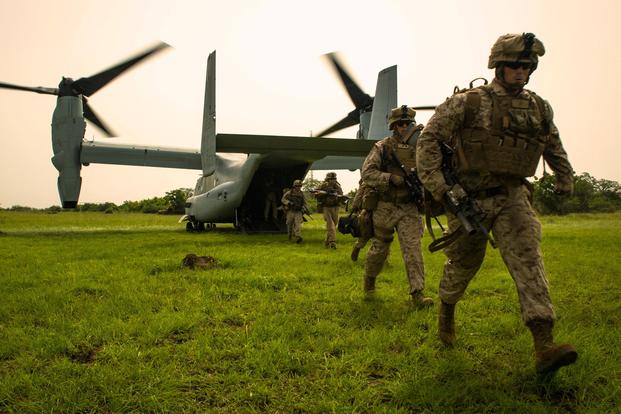Daniel R. DePetris is a fellow at Defense Priorities and a columnist at the Washington Examiner.
On Dec. 24, The New York Times reported that Defense Secretary Mark Esper was conducting a reassessment of the global U.S. military force posture, part of which involved considering the withdrawal of some of the 6,000 to 7,000 U.S. troops stationed in Africa. The arguments for a troop reduction are compelling -- though that hasn't stopped Capitol Hill from throwing a fit over the potential drawdown of troops in a region of the world that is, at best, peripheral to U.S. interests.
The report quickly ricocheted on Capitol Hill, where lawmakers in both the House and Senate are asking the Pentagon to rethink a troop reduction in the U.S. Africa Command theater of operations. Reps. Adam Smith and Mac Thornberry, the chairman and ranking member of the House Armed Services Committee, wrote a letter to Esper urging him to "carefully consider the adverse implications of reducing our force posture in Africa." That letter was delivered days after Sens. Lindsey Graham and Chris Coons stressed similar opposition to the idea.
The Trump administration is getting a lot of heat for even considering a force reduction in the Sahel, an area currently struggling with challenges including poverty, unemployment and terrorism. Esper will have to expend considerable time and attention explaining why such a reduction is necessary. However, the rationale for proceeding with the reduction is sound.
For one, the Pentagon's plans for the AFRICOM theater of operations should not be a surprise. The Trump administration published the National Security Strategy and the National Defense Strategy more than two years ago, documents that rightly put China and Russia at the center of Washington's grand strategy for the decade ahead. The focus on China specifically was a U.S. strategy shift that was long overdue after nearly two consecutive decades that consisted of rotating tens of thousands of American troops, trainers, advisers and special operators through Afghanistan, Iraq, the Persian Gulf and the Horn of Africa.
As the U.S. military was fighting multiple highly expensive and endless wars against a growing array of regional and locally based terrorist groups, China was using the time to expand its diplomatic presence around the world and sharpen its economic might. In 2008, China's GDP was $4.594 trillion; by 2018, the figure reached $13.6 trillion. While Washington was spending hundreds of billions of dollars on wasteful nation-building projects in Iraq and Afghanistan, Beijing was building itself into a global power.
The Trump administration's emphasis on great power competition was a welcome acknowledgment from the U.S. national security establishment that Washington could no longer afford to devote precious lives and limited resources to the wrong priorities. The troop review in the Sahel is the next logical step along the continuum, one that shouldn't be avoided just because it causes discomfort in certain quarters.
U.S. national security policy should involve setting reasonable goals, matching those goals with the appropriate resources, and always evaluating whether vital U.S. security interests are truly at stake. One of the major mistakes of the 21st century is the Washington foreign policy community's unwillingness to understand which objectives are directly relevant to U.S. security and prosperity and which are best left for other allies and partners to manage. The political instability, internal crises and social dysfunction that characterize the Sahel do not rise to the level of a vital U.S. security concern.
Rather than trying to preserve a U.S. military presence in the Sahel that over time could easily grow into another permanent deployment, lawmakers should assist the administration in prodding the Europeans to get far more involved in the region over the long term. Greater European security and economic investment would not be an act of charity; as events over the last several years have shown, what happens in Niger, Mali, Burkina Faso, Chad and Mauritania impacts Europe far more than it impacts the United States. Nowhere is this more visible than in the migration crisis that has divided the European Union since 2014, a byproduct of political persecution, terrorism and the absence of economic opportunities in the Sahel and West African regions.
The EU has referred to the Sahel as a "strategic priority" for the bloc. Yet with the notable exception of France, which just sent an additional 220 soldiers on top of the 4,500 forces it has already deployed, European states have chosen to pretend the problem doesn't exist. A token presence of European trainers can hardly be called a commitment befitting a strategic priority.
After the death of 13 French soldiers in Mali last November, French President Emmanuel Macron appealed to his fellow Europeans for an increase in their own contributions to the counterterrorism campaign. As Washington plans on troop withdrawals, it should serve as a force multiplier and amplify Macron's call. Indeed, if Europe wants to be taken seriously on foreign affairs again, its leaders need to embrace the lead role in security challenges that directly affect the continent.
The United States is still the world's most powerful country, but even Uncle Sam doesn't have unlimited resources. The Pentagon should block out the noise and proceed with its plans to cut the bloat from AFRICOM. As Beijing rises, we can't afford to find ourselves caught unprepared for the century ahead that will be defined by great power competition. Failing to follow through will turn U.S. national security and defense strategies into a worthless academic exercise.
-- The opinions expressed in this op-ed are those of the author and do not necessarily reflect the views of Military.com. If you would like to submit your own commentary, please send your article to opinions@military.com for consideration.













